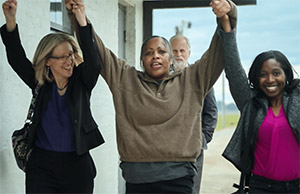
Tina Jimmerson
In the fall of 2018, we shared the good news that CWC client Tina Jimerson was releasedpending the Arkansas Attorney General’s appeal of a grant of federal habeas corpus relief toTina. Today, we write about our most recent victory in the fight to exonerate Tina. The EighthCircuit Court of Appeals issued an opinion affirming the District Court’s grant of federal habeas relief in Tina’s case.
Tina was serving a life sentence in connection with the 1988 robbery, rape, and murder of an elderly woman in a small Arkansas town. After more than two years with no leads, the police arrested three local Black men (the victim was White): Charlie Vaughn, John Brown, andReginald Early. Tina, a Black woman who became a police suspect after attempting to report her own sexual assault by a White man, was arrested based on the confession and guilty plea ofVaughn, who was mentally challenged and who immediately recanted his confession. According to Vaughn, he was pressured to confess to avoid the death penalty. Vaughn also implicated Early and Brown. All of the defendants were convicted and sentenced to life.
In 2013, Tina’s case found its way to the Center on Wrongful Convictions Women’s Project, and the late great Karen Daniel. After some investigation, Karen serendipitously learned that police had acquired Vaughn’s confession by sending a previously undisclosed informant into Vaughn’s jail cell to elicit incriminating statements. Later, it was discovered that the informant recorded his conversations with Vaughn, but police destroyed the recording, apparently at the direction of the prosecuting attorney—who now sits on the Arkansas Supreme Court. Based on this information,Karen filed a federal habeas petition on Tina’s behalf in June 2015 in the U.S. District Court for the Eastern District of Arkansas, alleging due process violations underBrady v. Maryland(failure to disclose exculpatory evidence) andArizona v. Youngblood(willful destruction of potentially exculpatory evidence). At the end of 2015, Reginald Early, one of Tina’s co-defendants, admitted to his attorney that he alone committed the rape and murder. By then,Andrea Lewis had joined the legal team. Early permitted his attorney, Karen Thompson(Northwestern JD class of 2003), to disclose his admission, and he signed a detailed affidavit.Karen and Andrea added a claim of actual innocence to Tina’s pending habeas petition.
After a 2016 evidentiary hearing in federal district court in Little Rock, the magistrate judge acknowledged that prosecutorial misconduct had occurred, but recommended against relief.Nonetheless, the district court judge granted Tina relief on her Brady and Young blood claims, and on October 26, 2018, Karen and Andrea walked Tina out of prison to await the AttorneyGeneral’s appeal.
Andrea argued the case before the Eighth Circuit in November 2019, after it was consolidated with the case of Tina’s co-defendant John Brown (who filed similar habeas claims after Tina’s petition was filed). On April 29, 2020, the Eighth Circuit affirmed the Young blood claim for bothTina and John Brown. The court found that the prosecutor and law enforcement had acted in concert to intentionally conceal the recording of the informant’s conversations with Vaughn. In doing so, Tina and Brown were effectively prevented from challenging the veracity of CharlieVaughn’s confession, and the court inferred that the State’s actions “had substantial and injurious effect or influence on the jury’s verdicts.”
In April of 2020, the Eighth Circuit affirmed the grant of habeas. Finally, after much communication with the prosecuting attorney’s office, the office agreed to drop the charges against both Tina and her co-defendant, John Brown (who is represented by the MidwestInnocence Project).
As usual, the work of numerous CWC clinic students has been invaluable. Over the years, students located and digested archival case documents, researched Arkansas state law remedies and federal constitutional law, corresponded with the client, visited her in prison in Arkansas, and helped draft federal pleadings in both the district court and the Eighth Circuit. These students include Allie McDonald (2014), Jolie Waldman McLaughlin (2014), Alex Tievsky (2015),Rachel Dillon (2016), Sylvia Baraniewski (2016), Hane Kim (2020), and Sam Rasche (2020).Northwestern Law alumni have also played roles in attempting to right the wrongs that were done in this case. Alex Tievsky and our own Danny Greenfield graciously helped moot theEighth Circuit oral argument, and CWC Advisory Board member Stuart Chanen continues to represent Charlie Vaughn, who remains in prison

